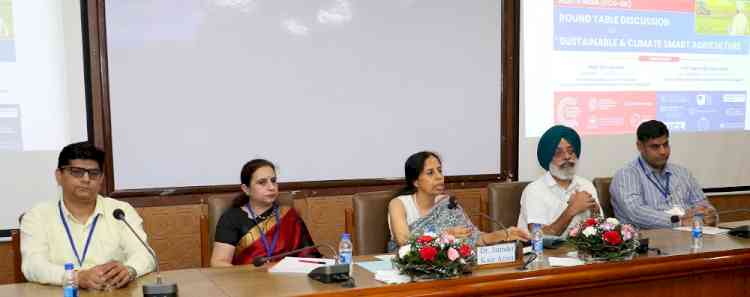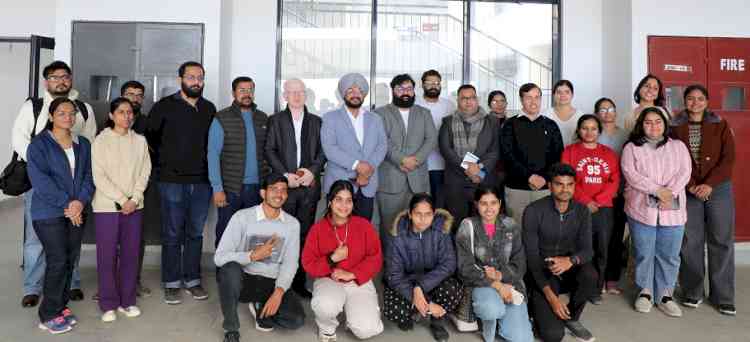Panjab University hosts a Roundtable on Sustainable and Climate Smart Agriculture
Panjab University, Chandigarh and the Climate Compatible Growth network, UK organised a roundtable discussion on "Sustainable and Climate Smart Agriculture".

Chandigarh, August 29, 2025: Panjab University, Chandigarh and the Climate Compatible Growth network, UK organised a roundtable discussion on "Sustainable and Climate Smart Agriculture".
Deputy Head of Mission at the British Deputy High Commission in Chandigarh, Amandeep Grewal inaugurated the event as the Chief Guest. In his keynote address, Grewal emphasised the need for agricultural growth with climate resilience. He highlighted the importance of adopting sustainable practices to ensure long-term food security and stressed the potential for India-UK collaboration in advancing green technologies and climate-smart agriculture. He reaffirmed the UK's commitment to supporting India's climate goals through inclusive and innovative partnerships.
More than forty experts from different fields took part in the roundtable discussion. They included professors from universities like Panjab University, Punjabi University, PGIMER, IIT Ropar, and MGSIPA; officials from government organisations such as the Punjab State Council for Science & Technology, Directorate of Environment and Climate Change, Punjab Development Commission, Government of India, Agricultural Technology Management Association, and Krishi Vigyan Kendra; as well as members from NGOs like Vetiver, Iora Ecological Solutions, and the Roundglass Foundation. The event also featured participation from Farmer Producer Organizations (Jagriti and Sukhmani Women), agri-entrepreneurs (Green Affair, Biofield Power), and progressive farmers, fostering a rich, multi-stakeholder dialogue on advancing climate-smart agriculture.
The roundtable discussion focused on three key sessions. Dr. B.S. Ghuman, former Vice-Chancellor of Punjabi University, chaired the session titled 'The Journey to Net Zero Agriculture: Policy Frameworks and Programmes'. He highlighted that farmers must be central to all agricultural discourse, noting that even the best-intentioned policies will fall short without effective on-ground implementation. Dr. Ghuman called for actionable, farmer-centric frameworks that translate policy into tangible, measurable impact at the grassroots level.
Dr. Jatinder Kaur Arora, Advisor to the Northern Region Science & Technology Cluster, Office of the Principal Scientific Advisor, Government of India, chaired the 'Deploying Technologies to Decarbonise Agriculture' session. She mentioned the critical role of collaborative innovation, particularly through agritech startups, in driving scalable, sustainable solutions. Dr Arora called for establishing clear procedures for carbon trading and water credits, along with accessible technologies tailored for Farmers' Producers Organizations.
Kahan Singh Pannu, I.A.S. (Retd.), chaired the 'Empowering Farmers through Technology and Extension Services' session. He advocated for agricultural commercial branding using behavioral insights to accelerate technology adoption among farmers. He urged regional institutions tofocus on adapting and scaling affordable innovations. He highlighted the potential of carbon markets in the agriculture sector and advocated for boundary plantation as a strategic solution to reduce stubble burning.
The event was coordinated by Prof. Suman Mor, Department of Environment Studies, and Prof. Ramanjit Kaur Johal, Panjab University, Chandigarh. The Foreign and Commonwealth Development Office, UK, funded this programme.
While summarizing the key outcome of the event, Prof. Suman Mor mentioned that Punjab reaffirmed its commitment to achieving Net Zero by 2050. She specifically highlighted the efforts of launching digital platforms to enhance stubble management and the promotion of alternative crops as a sustainable alternative to paddy. She mentioned that discussions also introduced carbon finance models to incentivise climate-friendly practices, emphasized behavioral change strategies and visual tools for farmer engagement, and expanded vocational and capacity-building initiatives through Krishi Vigyan Kendras.
Dr. Ramanjit Kaur Johal, Co-coordinator, CCG Network, mentioned that the recommendations emerging from the roundtable would be consolidated into an action plan to strengthen on-ground implementation and shape future climate-smart agricultural policies. She added that the stakeholders' strong interest in collaborative efforts signals a shared commitment to climate-compatible growth and will play a vital role in developing practical, scalable solutions and building capacity for their execution.



 City Air News
City Air News 










